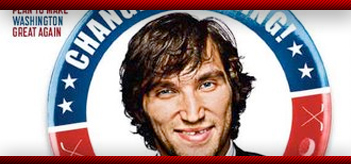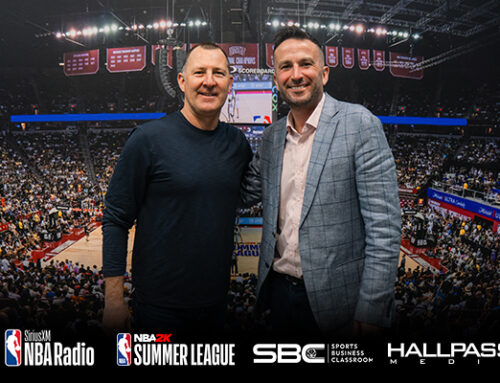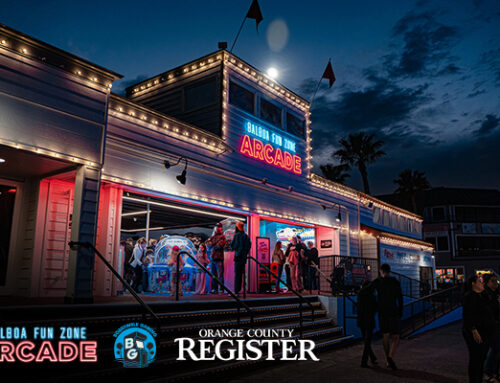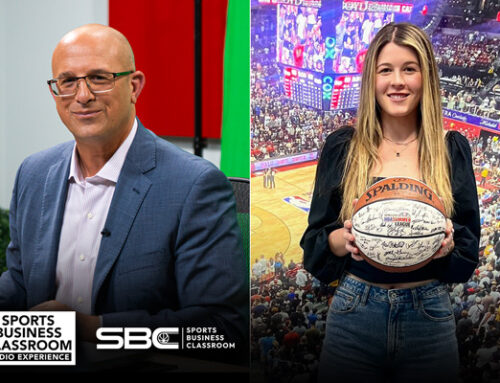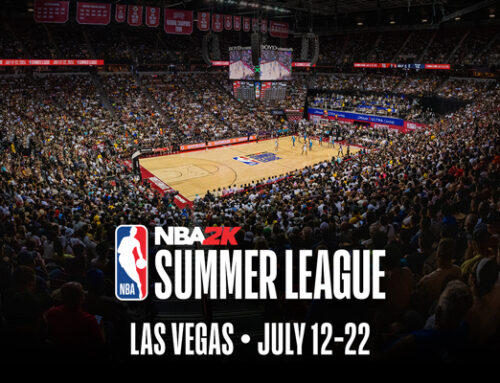ERIC ADELSON – ESPN THE MAGAZINE
Standing at the podium, he smiles while waving at the masses gathered on the century-old steps beneath him.
“Thank you,†he yells to the mob. “Thank you for your support.†He looks across Pennsylvania Avenue to those chanting his name and notices that passengers on a sightseeing bus are craning for a glimpse. He’s surrounded by Washington dignitaries—current mayor Adrian Fenty and former mayor Marion Barry among them—and framed from behind by a government building and men in dark sunglasses. Finally the cheers die down, and the new leader speaks:
“Today I am president, so there is no speed limit!â€
The crowd roars with laughter as Alex Ovechkin grins. No, this isn’t a frigid January Inauguration Day on the Capitol steps, just a key-to-the-city event on a steamy June afternoon at the Wilson Building a few blocks away. No, Ovechkin isn’t a politician or an elected official or even an American citizen. He’s just a 23-year-old hockey player from Moscow.
Not that he doesn’t have political cred.
In the tradition of Teddy Roosevelt, Ovechkin is a maverick brought to DC to reform and rebuild. À la LBJ and Reagan, he has a glint in his eye and an ability to make friends and disarm enemies. And like Washington and Lincoln, his presence brings calm reassurance. Ovechkin has been in town less than four seasons, yet he has the entire Beltway buzzing. Obama and McCain can only hope to change Washington the way Ovechkin has. His 65 goals last season helped transform the Capitals from backbenchers to playoff-caliber power players. And good luck to the next POTUS in his search to find a cabinet as talented as No. 8’s supporting cast.
Like the timetable facing any new administration, the first 100 days of the NHL season will test Ovechkin’s regime. Momentum from last season’s furious final run means nothing. Pittsburgh has a Stanley Cup Finals appearance in its rearview mirror; Detroit returns everyone and adds prolific scorer Marian Hossa; division rival Tampa Bay has Barry Melrose’s mullet behind the bench. And, let’s face it, the Caps are young and still not known for their defense department. But even as Americans decide whom to elect president, this red-white-and-blue-draped Russian will begin delivering on his own campaign promises—and on memorable presidential oratory from past and present.
Solutions are sometimes inspired by the darkest times: the Civil War, the Great Depression, the NHL lockout. The Caps finished with twice as many losses as wins in 2003-04, cutting ties with Jaromir Jagr, the biggest free agent bust in franchise history. “I had to face facts,†says owner Ted Leonsis. “The only way to get really, really good was to get really, really bad.â€
Ovechkin, the No. 1 overall pick in the 2004 draft, became Leonsis’ last, best hope. “Every great team has a major player,†the owner says. “If it’s the wrong guy, bang, you’re dead.†But Leonsis already had a feeling about Ovechkin. When the team sent him his first contract, he refused to sign it and mail it back. He wanted to ink the deal in the presence of GM George McPhee so he could shake his hand and thank him. Less than three years later, the Caps won the Southeast. What did Ovechkin do to reform Washington? Scoring 163 goals in three seasons helped. So did his infectious spirit, which energized the franchise.
Ovechkin will answer the phone at 3 a.m.—it’s called accountability. “He’s the first guy at the computer after the game, wanting to see his shifts,†says coach Bruce Boudreau. “He wants to think about the game. If he doesn’t understand something, he makes sure he gets it right.â€
Ovechkin has so much energy he’s practically radioactive. On the ice, he moves from zone to zone so quickly that linemates struggle to keep up. In the locker room, he darts around like a horsefly. After the Caps won the Southeast last season, Ovechkin pulled a freshly printed championship T-shirt over his dress shirt and announced he was going out on the town. D-man Mike Green shot him a no-way-I’m-going-out-like-that look but joined the party after forwards Alexander Semin and Sergei Fedorov copied Ovie. “He’s full of life,†says Caps captain Chris Clark. “Gets everybody going, jumping around. We ask how he does it, and he says, ‘I don’t know what I do, I just do!’†In Ovechkin, the Caps have a leader who is ready to roll up his sleeves, a star who is still a working stiff.

Every leader needs a populist strain—a little something to remind followers that he’s not that different from the common man. Witness Ovie’s goal celebrations. He checks himself into the glass and bounces around like a bumper bowler who has just rolled a four-carom strike. “Half the time he ends up knocking somebody over,†says forward Brooks Laich. “Sometimes you get scared.†Ovechkin could carry himself like some hockier-than-thou arugula-eater, but when he was asked for an autograph by a fan named Phil, he signed it “To Fill.†Sure he loves Dolce & Gabbana, but, says Laich, “he has this pair of sweatpants-jeans combination, and you’d swear some bum in an alley sewed ‘em together. His hair is a mirror of his personality. He even lost a tooth, and he doesn’t care about that. He doesn’t care that he’s not the most marketable player. He sells the game with how he plays it.†True that. His goals make him a YouTube staple (an homage set to Aerosmith’s “Dream On†is a classic), but his zest for life makes him a perfect fit for Wonkette. And how can you not love a guy who gives out all but two cell-phone digits during a contest, offering a date to the first woman who calls the right number?
Ovechkin’s transformation of Washington has been remarkable because DC puckheads are not accustomed to voting with their wallets. “Let’s be honest,†says Caps legend Peter Bondra. “Washington is not Hockeytown.†No wonder: When it first joined the league in 1974-75, it finished 8—67—5 with a 1—39 road record. Rod Langway, one of only four Caps Hall of Famers, arrived in 1982 from Montreal, where, he says, “18,000 people knew my entire life.†In DC, he adds, “it took two years for people to know me.â€
Now, a Russian has turned the Verizon Center into a hockey mecca. During the playoffs, media from as far away as Edmonton and Europe were regulars at morning skates. Ovechkin has even reached across the sports aisle to appeal to the bases of other teams. “Alex has the confidence of the fans and the city,†says Hoyas hoops coach John Thompson III. “He has enthusiasm and cares about what he’s doing. He’s gonna make us win games.†Note the use of the word us. The Caps have Capitalized on Ovechkin’s dedication to a Washington rarity: trust.
Every leader needs a climactic story point that illustrates his character. For John McCain, it’s his time in a POW camp; for Barack Obama, it’s his speech at the 2004 Democratic Convention. For Ovechkin, it’s a game in Pittsburgh last season when he took a skate to the leg and left the Igloo with a six-inch gash. None of the Caps would have blamed him for returning to DC to heal, but Ovechkin traveled with the team to Ottawa and played two nights later, scoring four goals and an assist in an 8-6 win. “Every time he moved, the stitches opened,†says Boudreau. “And he played through it.†Fans may remember the ass-over-teakettle goal he netted in a 6-1 win over Phoenix in 2006, but Caps officials cherish that cold night in Ottawa when their leader proved he could be counted on when needed most.
Time and again, Ovechkin has proved he is at his best during a crisis. On Thanksgiving Day last season, the Caps fired coach Glen Hanlon and promoted Boudreau. The ex-Slap Shot extra told the team he considered them playoff- worthy, and Ovie backed him up. That support inspired young players like Green (18 goals, tops among D’s) to take chances and move the puck. The league’s fourth-overall pick, Nicklas Backstrom, finally started playing like one (ending his rookie year with 69 points), and Laich turned hot and finished with 21 goals. “It was good for us to hold tight and keep with the game plan,†says Clark.
CHANGE IS COMING IN WASHINGTON THIS FALL.
The team finished the regular season with seven straight wins (and seven straight sellouts)—a.k.a. The Surge—to complete a worst-to-first run. The Caps then pushed the Flyers to seven games before bowing out in the first round of the playoffs. “We finally got some fans into the building,†says Laich. “The Verizon Center was the loudest arena I’ve ever played in.†How loud? Fedorov broke his stick in Game 1’s 5-4 win, but didn’t even hear it snap. “Where else would the No. 1 superpower be a Russian and embraced?†says Leonsis. “It’s a new world! New rules!â€
No, he’s not American. But in a way, that makes Ovechkin’s leadership qualities unique. His mother, Tatiana, also wore No. 8 and won Olympic gold as a point guard for the Soviet Union in 1976 and 1980. She raised her youngest to be aware of everyone on the ice. The concept was reinforced by coaches from the Soviet hockey program, who taught players to think of themselves as part of a five-man unit. “It’s a lot of passing, skating, creating space,†says former Red Wings great Igor Larionov. “There’s no way one guy is going to carry the team. You have to have a core of players.â€
Ovechkin brought that style to America, taking command of the game when necessary but cheering just as loudly for a teammate’s blocked shot as for a goal. Before a shootout in Pittsburgh in January, Ovechkin gave teammate Quintin Laing a high-five for critical late-game blocks, then picked up the puck and scored. Ovechkin also calls Caps brass repeatedly during the summer to make sure contract negotiations with teammates and free agents move quickly. And for good measure, he has decorated his BMW M6 with a Caps flag. Ovechkin may have a Soviet background, but he’s developed an appealing American backstory.
Not many Washington outsiders have turned victory into influence as quickly and completely as Ovechkin. After he collected his four trophies for the 2007-08 season—Hart (the team’s first league MVP), Lester B. Pearson (the players’ MVP), Maurice Richard (most goals) and Art Ross (most points)—Ovechkin told Leonsis he would trade all four for one Cup. That’s managing up. And for the first time this American century, a DC Cup run sounds feasible.
“We think we can be good,†says Laich. “We aren’t afraid of anybody. We’re very curious to see how good we can be.†Ovechkin already knows: “Washington can do the same as Pittsburgh, except we’ll win the Cup.†Even Detroit coach Mike Babcock is convinced, telling Leonsis, “No one wants to play you guys.†You know change has come when enemies are believers.
We even have a sneak preview of how Ovie might celebrate. Back in June, he took his league hardware along with the accolades and went directly from the awards stage in Toronto to the nearest McDonald’s drive-through, where he ordered $60 worth of Big Macs for his entourage.
It doesn’t get any more American than that.


